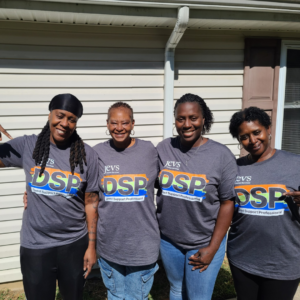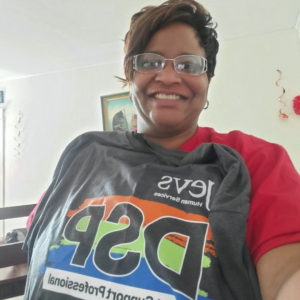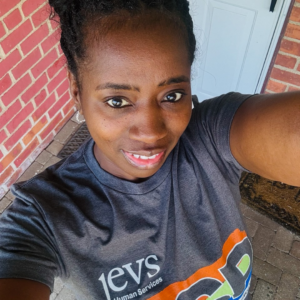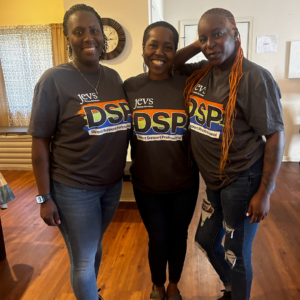By Clara T.
A Direct Support Professional (DSP) goes beyond being a caregiver. A DSP provides whole life support for people with disabilities so they can be active in their communities, find jobs, and live fulfilling lives.
DSPs at JEVS Human Services (JEVS) help people learn how to do things for themselves and how to live and make decisions independently.
For example, a caregiver will do things for someone, like pick out groceries, but a DSP will work with someone to help them to learn to pick out their own groceries. This difference is important because it helps the person be as independent as possible.
Each person is unique, with different needs and abilities. DSPs are trained in a variety of methods and interventions based on the needs of the person they support. They perform some functions of therapists, service coordinators, administrators, managers, maintenance and clerical staff as they support people. DSPs are held to a high Code of Ethics and set of Core Competencies validated by the National Alliance of Direct Support Professionals.
Providing whole life support
DSPs support activities of daily living such as grooming, household care, meal planning and preparation, and taking medication. They also support with health-related tasks such as making and keeping medical appointments along with any necessary follow up. They help people learn to speak up for themselves. They help people stay connected to friends and family as well as exploring their neighborhood and local community or find a job. DSPs are there to provide emotional support as people navigate life’s hills and valleys.
There is no typical day for a DSP. Much of the job entails responding to unanticipated needs, from minor to more significant, including personal tasks that require mutual trust and respect. This job takes grit and compassion. On tougher days a DSP must remind themselves that their support is vital.
Making vital contributions
DSPs make vital contributions to our society and economy. Historically, this work has not been given the respect it deserves, and the pay is entry level. Nationally, 87% of DSPs are women, and 53% are women of color. This brings longstanding inequities based on gender and race to the forefront. There is currently a bill in Congress to give DSPs their own occupational classification which will recognize this profession and start the process to give respect and acknowledge contributions these employees make.
DSPs are a quarter of the workforce at JEVS. With their support, the people who live in our residential program thrive. Our staff make sure each person has all needs met – food, clothing and other belongings, medication, healthy environment, safe travel, and social engagement. They help people find activities that bring them joy. They celebrate holidays, pay attention to help maintain relationships, scour the city for interesting things to do, try new recipes, and encourage hobbies. DSPs are there to coach people in navigating and enjoying their lives.



